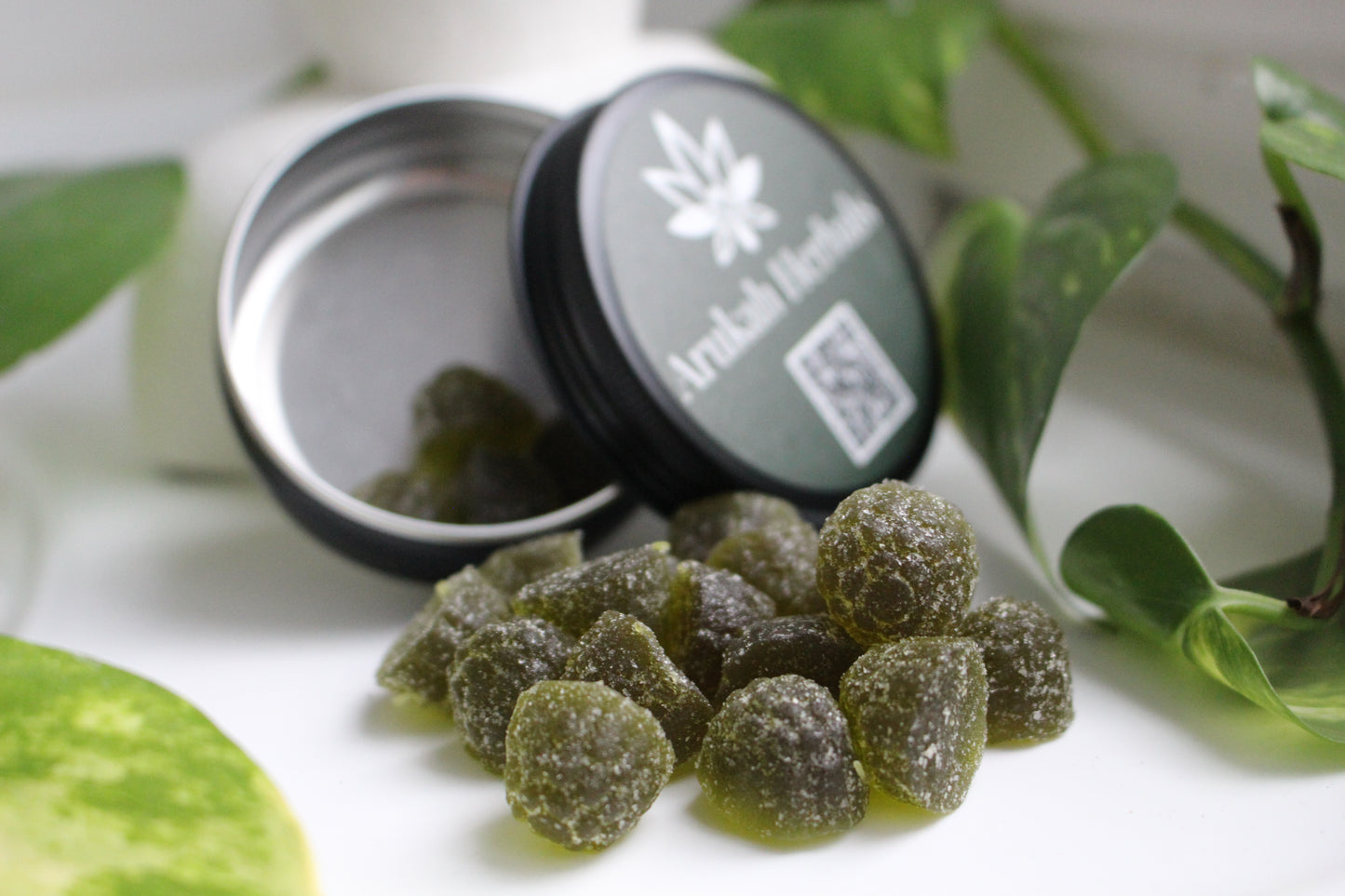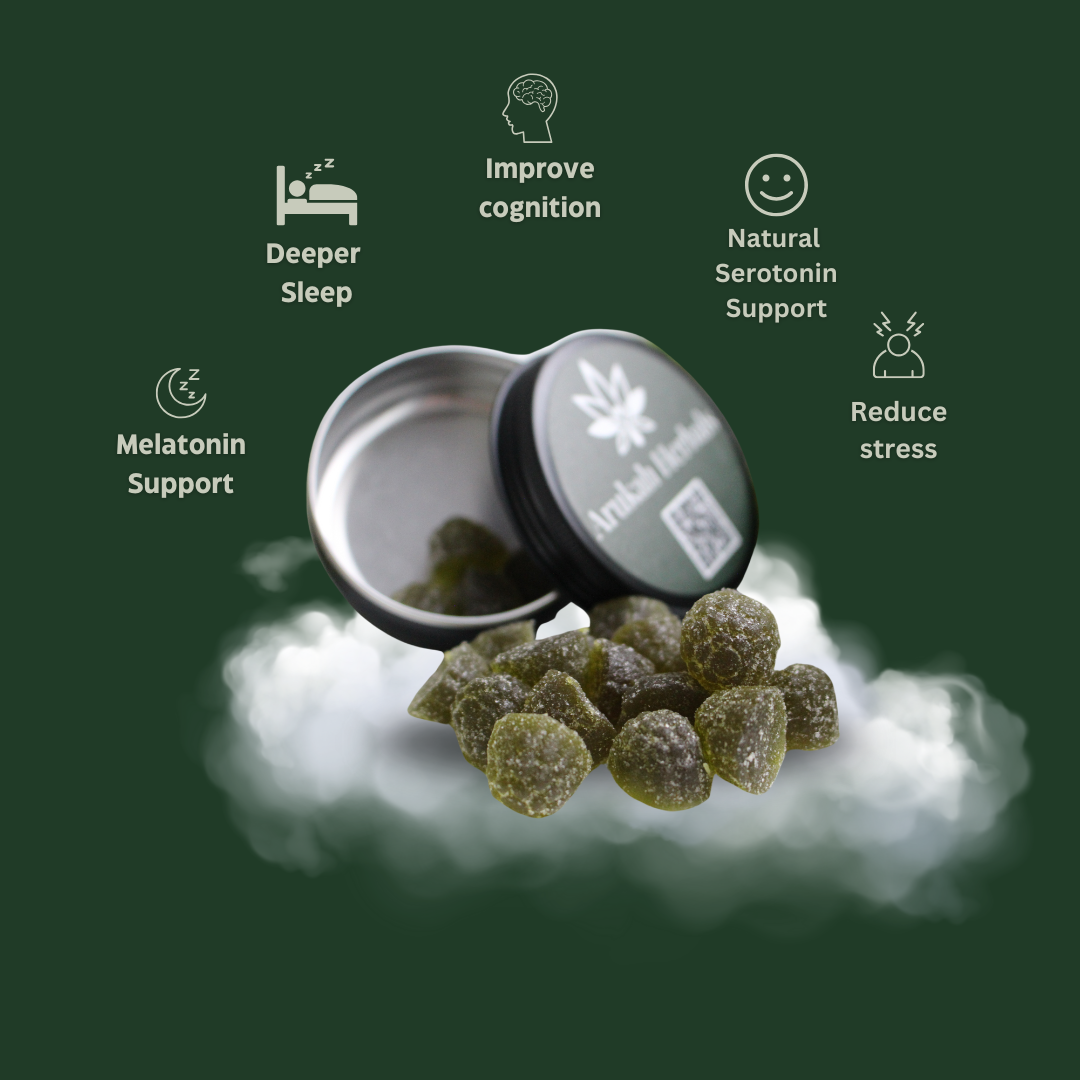
Menopause? Peimenopuase? Some of the best natural remedies for menopause and perimenopause
Share
What is menopause? Symptoms of menopause
Menopause is a stage in a woman's life, typically occurring between the ages of 45 and 55, when the ovaries cease producing eggs and the body undergoes hormonal changes. This transition often comes about with some uncomfortable symptoms such as hot flashes, night sweats, sleep disturbances, and increased stress. Many women are finding alternative natural remedies to use as well as hormone replacement therapy (HRT) to manage these symptoms.
Among the most popular are passionflower, lemon balm, and chamomile— herbal ingredients that have displayed impressive results amongst menopausal or perimenopausal women, experiencing discomfort, stress and sleep issues.
Our gummies contain all three excellent ingredients, including 5HTP which acts on the Serotonin levels in your brain assisting to mood elevating results, on top of natural production of more Melatonin.
Navigate to our shop to purchase the gummies today
Menopause? Peimenopuase? Some of the best natural remedies for menopause and perimenopause
1. Passionflower: Relieving Stress and Improving Sleep
Passionflower (Passiflora incarnata) is an herb known for its calming effects, making it beneficial for women experiencing stress, anxiety, and sleep disturbances during menopause. It works by increasing the activity of gamma-aminobutyric acid (GABA) in the brain, a neurotransmitter that promotes relaxation and reduces neuronal excitability. This calming effect is particularly useful for managing the heightened stress and emotional instability that can accompany menopause.
In addition to its anxiolytic properties, passionflower has been shown to improve sleep quality. Many women undergoing menopause experience insomnia, often triggered by night sweats or hot flashes. Passionflower’s sedative effects can help improve sleep by reducing the anxiety that often keeps women awake at night.
Scientific Research:
A study published in Phytotherapy Research (2010) compared the effects of passionflower to the anti-anxiety medication oxazepam. The results showed that passionflower was equally effective in reducing anxiety, with fewer side effects. Additionally, a study in BMC Complementary and Alternative Medicine (2013) found that passionflower helped improve sleep quality in individuals suffering from insomnia, which is a common symptom of menopause.
Phytotherapy Research Study - Passionflower
BMC Complementary and Alternative Medicine Study - Passionflower
2. Lemon Balm: Easing Hot Flashes and Sleep Disturbances
Lemon balm (Melissa officinalis) is another herb that has been shown to help alleviate menopause symptoms, particularly hot flashes and sleep disturbances. It contains compounds that can enhance the production of GABA and serotonin, both of which are crucial for mood regulation, relaxation, and sleep. Lemon balm’s calming properties help reduce the intensity and frequency of hot flashes, which are one of the hallmark symptoms of menopause.
Lemon balm is also known for its mild sedative effects, making it a useful remedy for improving sleep quality. Women experiencing menopause often struggle with disrupted sleep patterns due to hot flashes and hormonal imbalances. Lemon balm can help induce a state of relaxation, allowing for more restful sleep.
Scientific Research:
A study published in Menopause: The Journal of the North American Menopause Society (2015) evaluated the effects of lemon balm on menopausal symptoms. The results suggested that lemon balm significantly reduced hot flashes and improved sleep quality in women undergoing menopause. Another study, published in Phytotherapy Research (2004), found that lemon balm was effective in reducing anxiety and promoting relaxation, which can help manage menopause-related stress.
Menopause Journal Study - Lemon Balm
Phytotherapy Research Study - Lemon Balm
3. Chamomile: Managing Hot Flashes, Sleep, and Stress
Chamomile (Matricaria chamomilla) is a well-known herb used for its soothing properties, particularly in managing stress and sleep disorders. Chamomile contains apigenin, a flavonoid that binds to benzodiazepine receptors in the brain, promoting relaxation and reducing anxiety. This makes chamomile especially useful for menopause-related stress, which can exacerbate other symptoms such as hot flashes and sleep disturbances.
Chamomile also has mild sedative effects, which can help alleviate insomnia often caused by hot flashes and night sweats. Drinking chamomile tea before bed is a common remedy for women who struggle to fall asleep due to menopause-related discomfort. Its ability to promote relaxation without causing drowsiness during the day makes it a popular natural option.
Scientific Research:
A study published in BMC Complementary and Alternative Medicine (2016) examined the effects of chamomile on sleep disturbances in postmenopausal women. The study found that chamomile improved both the quality and duration of sleep in women with sleep disorders. Another study in Molecular Medicine Reports (2015) highlighted chamomile’s ability to reduce anxiety and promote relaxation, providing additional benefits for women dealing with menopause-related stress.
BMC Complementary and Alternative Medicine Study - Chamomile
Molecular Medicine Reports Study - Chamomile
Conclusion
Passionflower, lemon balm, and chamomile are three natural remedies that have shown promise in alleviating menopause symptoms, such as hot flashes, night sweats, sleep disturbances, and stress. Scientific research supports their effectiveness in improving mood, relaxation, and sleep, making them valuable alternatives or adjuncts to traditional treatments like hormone replacement therapy (HRT). These herbs offer a natural, gentle approach to managing the discomforts of menopause, with fewer side effects and risks than pharmaceuticals.
Before beginning any herbal treatment, it's important to consult with a healthcare provider to ensure that these herbs are safe and suitable for your individual needs.







